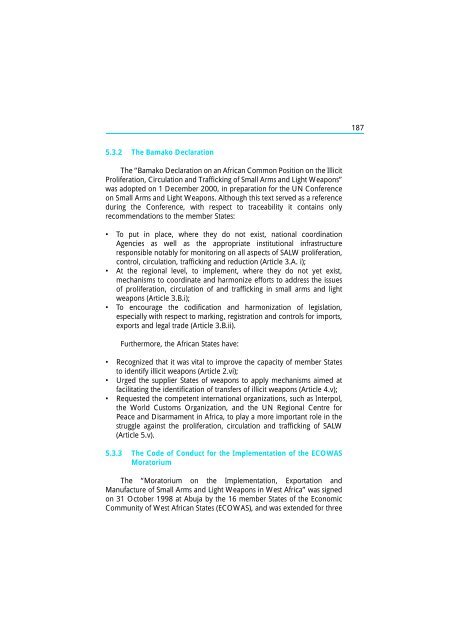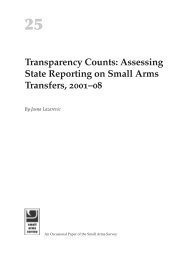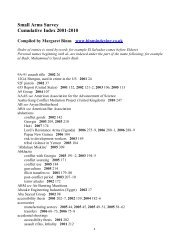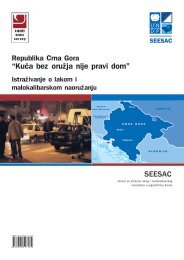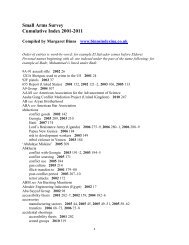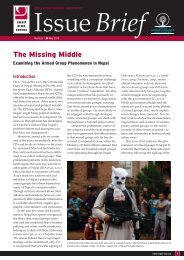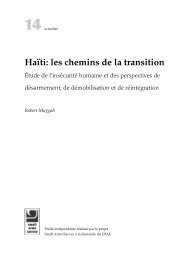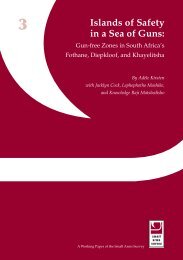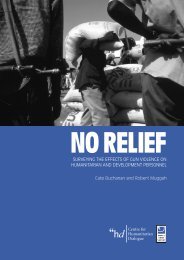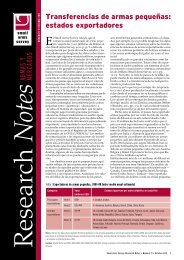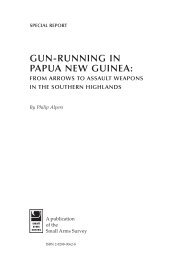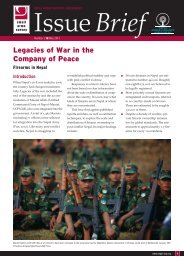The Scope and Implications of a Tracing Mechanism for Small Arms ...
The Scope and Implications of a Tracing Mechanism for Small Arms ...
The Scope and Implications of a Tracing Mechanism for Small Arms ...
Create successful ePaper yourself
Turn your PDF publications into a flip-book with our unique Google optimized e-Paper software.
187<br />
5.3.2 <strong>The</strong> Bamako Declaration<br />
<strong>The</strong> “Bamako Declaration on an African Common Position on the Illicit<br />
Proliferation, Circulation <strong>and</strong> Trafficking <strong>of</strong> <strong>Small</strong> <strong>Arms</strong> <strong>and</strong> Light Weapons”<br />
was adopted on 1 December 2000, in preparation <strong>for</strong> the UN Conference<br />
on <strong>Small</strong> <strong>Arms</strong> <strong>and</strong> Light Weapons. Although this text served as a reference<br />
during the Conference, with respect to traceability it contains only<br />
recommendations to the member States:<br />
• To put in place, where they do not exist, national coordination<br />
Agencies as well as the appropriate institutional infrastructure<br />
responsible notably <strong>for</strong> monitoring on all aspects <strong>of</strong> SALW proliferation,<br />
control, circulation, trafficking <strong>and</strong> reduction (Article 3.A. i);<br />
• At the regional level, to implement, where they do not yet exist,<br />
mechanisms to coordinate <strong>and</strong> harmonize ef<strong>for</strong>ts to address the issues<br />
<strong>of</strong> proliferation, circulation <strong>of</strong> <strong>and</strong> trafficking in small arms <strong>and</strong> light<br />
weapons (Article 3.B.i);<br />
• To encourage the codification <strong>and</strong> harmonization <strong>of</strong> legislation,<br />
especially with respect to marking, registration <strong>and</strong> controls <strong>for</strong> imports,<br />
exports <strong>and</strong> legal trade (Article 3.B.ii).<br />
Furthermore, the African States have:<br />
• Recognized that it was vital to improve the capacity <strong>of</strong> member States<br />
to identify illicit weapons (Article 2.vi);<br />
• Urged the supplier States <strong>of</strong> weapons to apply mechanisms aimed at<br />
facilitating the identification <strong>of</strong> transfers <strong>of</strong> illicit weapons (Article 4.v);<br />
• Requested the competent international organizations, such as Interpol,<br />
the World Customs Organization, <strong>and</strong> the UN Regional Centre <strong>for</strong><br />
Peace <strong>and</strong> Disarmament in Africa, to play a more important role in the<br />
struggle against the proliferation, circulation <strong>and</strong> trafficking <strong>of</strong> SALW<br />
(Article 5.v).<br />
5.3.3 <strong>The</strong> Code <strong>of</strong> Conduct <strong>for</strong> the Implementation <strong>of</strong> the ECOWAS<br />
Moratorium<br />
<strong>The</strong> “Moratorium on the Implementation, Exportation <strong>and</strong><br />
Manufacture <strong>of</strong> <strong>Small</strong> <strong>Arms</strong> <strong>and</strong> Light Weapons in West Africa” was signed<br />
on 31 October 1998 at Abuja by the 16 member States <strong>of</strong> the Economic<br />
Community <strong>of</strong> West African States (ECOWAS), <strong>and</strong> was extended <strong>for</strong> three


